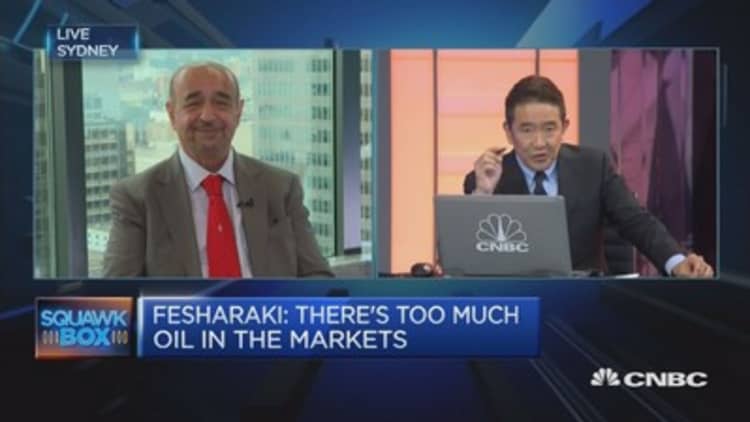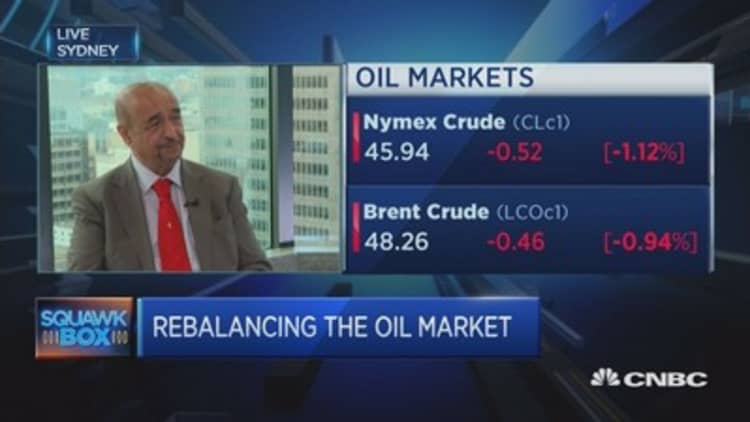
A leading global energy market academic warned that crude prices could sink back to $30 a barrel if OPEC fails to make additional cuts to production.
"The problem is that there is too much oil on the market. There is too much oil from the U.S., too much oil from Libya, too much oil from Nigeria," said Fereidun Fesharaki, founder and chairman of consulting group FGE, which focuses on oil and gas markets east of the Suez and in Europe and the U.S.
"While the demand is robust, there is a serious likelihood that prices will sink next year to $30-$35 a barrel and will stay there for a while," he told Squawk Box on the sidelines of the Credit Suisse Australia Energy Conference in Sydney on Wednesday.
Fesharaki, who has studied Asia Pacific and Middle East energy markets since the early 1980s, said he believes the so-called red line for Saudi Arabia is 9 million barrels of oil per day, and any failure to cut below that level would cause a price pullback.
"You have to cut another 700,000 barrels per day right away or prices will sink," he said. "Even if you do this, next year you'll still have to cut more, so it comes down to how far the Saudis are prepared to cut."
Late last month, OPEC said it would extend an 1.8 million-barrel-a-day cut to oil output by nine months, though March 2018, after the November deal failed to fully clear a global oversupply in oil, which has been keeping prices relatively low. Some non-OPEC producers have also signed on to the deal.
Fesharaki said his assumption wasn't just based on oversupply.
Taking a contrarian view, he also believes that a slump in crude prices could lead to a slump in demand.
"A drop in the price of oil is like an earthquake or a tsunami," he added.
"If you have a small drop in the price of oil, then actually it's good for demand and good for economic growth, but last time the price of oil fell, the stock markets fell with it. I think there is a scary environment now that a substantial drop in the price of oil would actually create a global recession."

Other analysts have previously noted that a sharp drop in oil prices can weigh heavily on the economies of oil producers, which then can see declining consumer confidence and spending.
Qatar in crisis
Fesharaki believes the diplomatic crisis engulfing Qatar is unlikely to have a long term or substantial impact on global oil prices.
"It's not threatening any production, so the markets have yawned," he said.
Several Saudi-led Arab states abruptly cut off ties to tiny Qatar earlier this month.
Saudi Arabia has issued demands of Qatar, including ending relations with Iran, breaking all ties to the Muslim Brotherhood and expelling all members of Hamas, according to an Al Jazeera report. It also demanded Qatar shut down broadcaster Al Jazeera, which came under cyber attack last week.
The catalyst for the rift was an alleged statement by Qatar's emir that criticized Saudi Arabia and President Donald Trump, who recently visited Saudi Arabia in his first foreign trip, agreeing to new military contracts and a broader economic relationship.
Doha denies allegations that it has supported terrorism.
Turkey, a strong ally of Qatar, will send its foreign minister to Doha on Wednesday and possibly to Saudi Arabia, as it looks to end the feud.
"I don't see this as a factor impacting the oil market unless you get into a military confrontation – which is very unlikely," he said. "With Turkey now taking troops to Qatar and the Iranians supplying food and water, I think the stakes for the Saudis have become much bigger. If they escalate this further, then it can get very ugly."


